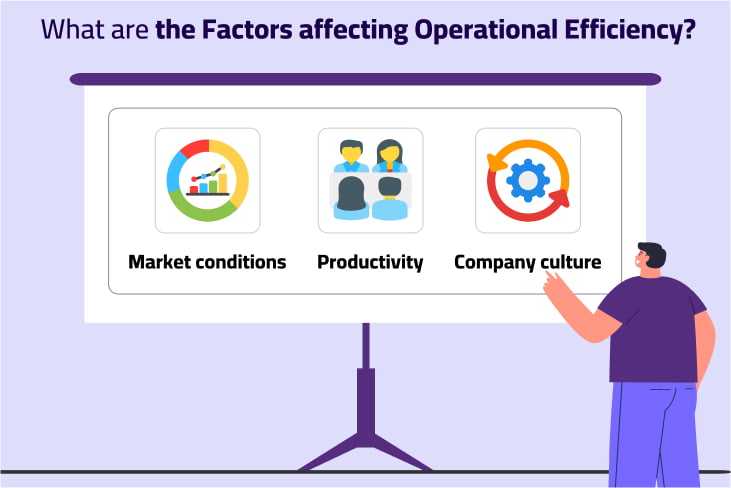What are the factors affecting operational efficiency?

There are several factors that affects the efficiency of operations in any company. Some of them are mentioned below:
- Market conditions: The operational efficiency of a corporation is significantly influenced by the external environment. For instance, to keep a competitive advantage in a highly competitive market, businesses may need to accelerate their workflows and swiftly adjust to shifting client expectations. Similar to how changes in customer preferences or raw material pricing may affect supply chain management and manufacturing schedules, these factors can also have an impact on overall efficiency.
- Company culture: Employee values, attitudes, and behaviors are shaped by company culture, which ultimately affects how work is done inside the company. Increased efficiency of operations may be fostered by a collaborative, innovative, and supportive culture that values ongoing progress. On the other hand, a toxic culture that is marked by a lack of communication can inhibit advancement and productivity. Thus, optimizing the efficiency of operations requires fostering an environment that values employee well-being, empowerment, and responsibility.
- Productivity: The efficiency with which resources are used to generate products or services is measured by productivity. Productivity levels are directly impacted by elements like labor training and skills, technology use, process automation, and resource allocation. Investing in the training and development of employees, implementing cutting-edge technology, simplifying processes, and allocating resources optimally may boost output and propel operational effectiveness.
What are the ways to improve operational efficiency?
Improving operational efficiency is crucial for businesses to remain competitive and maximize profitability. Here are several strategies to enhance operational efficiency:
- Find and remove bottlenecks or extra stages from your workflows. Process simplification lowers waste, saves time, and boosts output.
- Use digital tools, software, and automation to increase accuracy, decrease manual labor, and simplify processes. Project management software, enterprise resource planning (ERP) systems, and customer relationship management (CRM) systems are examples of this.
- Provide training and development opportunities for employees to enhance their skills and knowledge. Empower employees to make decisions and take ownership of their work, fostering a culture of accountability and efficiency.
- Give staff members chances for training and development to help them advance their knowledge and abilities. Encourage an environment of efficiency and responsibility by giving staff members the freedom to decide for themselves and to own their jobs.
- In order to reduce waste and increase productivity, analyze how resources are being used and distribute them wisely. This includes managing inventories, workforce levels, and equipment utilization optimally.
- Improve internal communication channels to promote cooperation and information exchange. This might entail developing an environment of open communication, scheduling frequent meetings, and putting communication tools into place.
- Put the needs of your clients first by providing effective, high-quality goods and services. Ask for and act upon consumer input to make ongoing improvements to services and procedures.
- Think about using outside contractors or vendors to handle non-core tasks or activities. With outsourcing, businesses may save expenses and gain more flexibility while concentrating on their core skills.
- Embrace lean concepts to maximize efficiency and eliminate waste, such as just-in-time inventory, continuous improvement, and waste reduction.
- Review and assess operating procedures on a regular basis to find areas that might need improvement. Remain flexible and adaptable, and continuously refine your tactics to maximize effectiveness.
Conclusion
The foundation of organizational success is operational efficiency, which helps companies stay sustainable, flexible, and competitive in the fast-paced market of today. Organizations may improve the efficiency of operations, cut costs, and provide value to consumers and stakeholders by adopting innovation, managing resources well, and continuously refining procedures. The quest for efficiency becomes not just a strategic goal but also a critical factor in long-term growth and success as firms aim for operational excellence.
Frequently asked questions
What are examples of operational efficiency?
- Automating processes like data entry.
- Optimizing supply chain management.
- Investing in employee training.
- Implementing energy conservation measures.
- Applying lean manufacturing principles.
What is the meaning of operational effectiveness?
How do you measure operational efficiency?
What are the key elements of operational efficiency?
- Process optimization.
- Resource management.
- Quality control.
- Technology integration.
- Continuous improvement.
What is the KPI to measure operational efficiency?
- Overall Equipment Effectiveness.
- Labor productivity.
- Inventory turnover ratio.
- Customer satisfaction score.
- On-time delivery rate.

